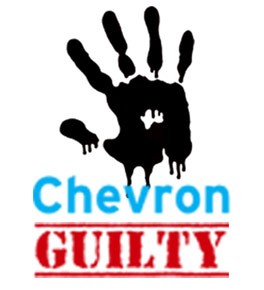
We’re very focused on Chevron’s environmental pollution and human rights abuses down in Ecuador here at RAN, but it’s important to remember that Chevron is a multinational corporation that has had a similarly devastating impact on communities around the world.
The Guardian recently posted a blog entitled “Why Chevron’s lawyers must be among the busiest in the world” that details how aggressive Chevron is with its bullying legal tactics as well as the company’s horrendous record as a corporate citizen. The post is absolutely spot on (emphasis is mine):
Oil is the dirtiest industry in the world and Chevron, one the world’s largest companies, must be the oiliest. That’s saying something when you consider it has rivals including BP, Shell, Exxon and Oxy. Never mind the gross violations of the Ecuadoran environment for which it was punished this week with a $8bn (£5bn) fine. When it comes to aggressive legal tactics, vindictiveness, threats, pollution, intimidation, tax evasion and links with venal and repressive regimes, it is in a league of its own as its corporate lawyers bludgeon, bully and try to beat with the law any opposition it meets around the world.
Here’s a small taste of how the company works. Back in the late 1990s, it hired and transported the ruthless Nigerian military to remove a group of impoverished villagers from an company oil platform they had peacefully occupied in protest against pollution and the lack of jobs in the Niger Delta. Two villagers were killed and others were injured and then tortured by the soldiers. In 2009, the case ended up in San Francisco where a jury found Chevron not liable but then the company – whose turnover makes it bigger than 137 countries – tried to sue the villagers for its costs of $485,000. Even the judge remarked that the case was deeply mismatched. “The economic disparity between plaintiffs, who are Nigerian villagers, and defendants, international oil companies, cannot be more stark,” she said.
As a corporate citizen, the company is lousy. It is involved in polluting tar sands in Canada, massive coal mining operations in the US, and it is in constant battle with the authorities and communities over illegal gas flaring in Nigeria and Kazakhstan. It is also one of the world’s leading 10 lobbyists. It has been strongly criticised for – but has denied – human rights violations on three continents. But what it cannot dispute is that it has partnered and supported dictators and despots in Burma, Africa and Asia.
Its lawyers must be some of the busiest in the world. Court records show that in the past 20 years, the company has been made to pay around $2bn in fines and settlements to governments and communities for tax evasion, and environmental violations around the world.
The bit about Chevron counter-suing the Nigerian villagers is notable, given that the company is essentially executing that same playbook with regards to Ecuador. (If you haven’t heard about Chevron’s ludicrous RICO suit against the Ecuadorean plaintiffs, you can read it and weep here on the Understory.)
The point being: Chevron goes into communities all across the world and exploits natural resources, polluting the communities and abusing human rights in the process, and then expects to get away with it. Unfortunately, in many cases the company does get away with it. And if the people Chevron has impacted dare speak up and demand clean up or compensation, Chevron goes after them ruthlessly.
Chevron is by no means alone amongst the Big Oil companies in its irresponsible business practices. That’s why it’s important to remember Chevron’s global impact and the larger issues it raises. I always say that the trial in Ecuador is not just about Ecuador and Chevron — it’s about the future of our global society and the future of life on this planet. Will we continue to let the wealthiest corporations poison our communities with impunity in their pursuit of ever-more-exorbitant profits, or will we demand accountability and equitable distribution of resources?
I know which one I choose. Ecuador needs to be the line in the sand. Enough is enough.